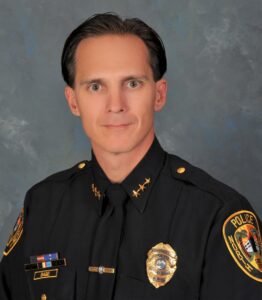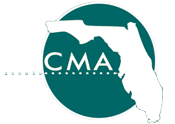 How long have you been an FCCMA member and why did you join?
How long have you been an FCCMA member and why did you join?
I have been a member for about two and a half years. I was encouraged to join by our former City Manager, Michael Beedie, who strongly valued career and professional development for his staff. He held FCCMA in very high regard and believed in its benefits. FCCMA has since provided me with numerous opportunities for professional growth, networking, and learning, all of which align perfectly with my career goals.
Are you an ICMA member?
No
Please describe your areas of formal/advanced education.
I hold a bachelor’s degree in psychology from Florida International University and a master’s degree in public administration from Barry University. In addition to my formal education, I have completed several advanced training programs, including the Federal Bureau of Investigation’s National Academy (Session 248), the Police Executive Research Forum’s Senior Management Institute for Policing, and the Florida Criminal Justice Executive Institute’s Chief Executive Seminar (Class 52). I also recently completed the Certified Public Manager Course at Florida State University.
These educational experiences have not only provided me with a solid foundation of knowledge but have also significantly contributed to my leadership development, allowing me to apply practical skills in my day-to-day role.
Why did you select a career in public service?
I chose a career in public service because I am passionate about community engagement and finding long-term solutions that address underlying issues, not just the symptoms. Throughout my career, I have sought to tackle challenges that go beyond policing, focusing on solving the root causes to make a lasting, positive impact in the community.
Have you always been in the public sector, or have you had experience in the private sector?
I have always worked in the public sector. I served in the United States Navy for a couple of years, followed by a year with the U.S. Border Patrol. However, I missed the direct interaction with local communities and helping people solve the problems affecting their daily lives. This led me to return to Miami, where I joined the North Miami Police Department, a community I had grown up in. After 20 years, I moved to Fort Walton Beach to serve as Chief of Police.
My experience across these diverse agencies has been instrumental in developing my leadership and problem-solving skills.
Please tell us about your current position and give a brief job description if you are not a City Administrator/Manager.
I am the Chief of Police for the City of Fort Walton Beach. In this role, I oversee the operations of the Police Department while also collaborating closely with other city departments. As one of the most public-facing officials, I frequently engage with the community on a wide range of issues that, while not always directly related to law enforcement, impact public safety. The role of Police Chief is multifaceted, requiring law enforcement leadership and serving as a community ambassador to address broader concerns and foster strong community relationships.
Please describe your typical day.
There is no typical day, and that’s one of the best parts of my job. Each day brings new challenges and opportunities to solve problems. My day often starts with administrative duties and preparing for community meetings. Throughout the day, I engage with stakeholders to address various issues, from affordable housing to public safety concerns such as the opioid crisis, but I always prioritize making time to connect with my personnel and address any concerns they may have. I’m fortunate to have a dedicated staff that manages the day-to-day operations of the police department, allowing me to focus on broader community problem-solving efforts. Before ending my day, I revisit administrative tasks and make sure to respond to anyone who has reached out, even if I can’t immediately resolve their issue.
What is your favorite part of the job?
There is so much I enjoy about my job, but the best part is being able to make a positive impact in my community. I love going out into the community, talking with people and groups, learning about their experiences, and finding ways to make things better. It’s incredibly rewarding to see the difference we can make when we work together to address challenges.
What is your least favorite part of the job?
It’s great to have a team with depth and talent, but one of the hardest parts of my job is choosing just one person for a promotion or transfer when several highly qualified candidates are equally deserving. It’s always a tough decision, and while I provide feedback to those not selected so they can continue to grow, it can be challenging when all the applicants are so well qualified.
Another difficult aspect of my job is speaking with victims of senseless violent acts and witnessing how these incidents have forever changed their lives. Seeing the true evil in the world is something no one should have to experience, but I am driven by the commitment to do everything in my power to prevent or deter these tragedies. These moments, though difficult, remind me of the importance of our work and motivate me to continue striving for solutions that make a real difference.
If you are involved in any volunteer or leadership activities in your community, please share with us a bit about what you do and why it is important to you.
I chair the Okaloosa Healthy Communities Group, a team of local leaders that meets at the Okaloosa Health Department to address key community-wide issues. We focus on reducing the housing burden, improving pedestrian safety, and reducing overdose deaths. This work is deeply fulfilling because it allows me to make a tangible, positive impact on issues that directly affect the community.
Additionally, I am an active member of the Okaloosa Health Behaviors Group, where I led the development of a county-wide post-overdose response team. This team offers services within 24 to 72 hours to individuals who have survived an opioid overdose. In the first six months of the program, we have successfully connected many individuals to treatment who might not have otherwise sought help.
I also serve as a board member for Advanced Sacred Hope Academy, a school specializing in individualized learning for students with autism and neurological disorders. I believe it’s crucial to support the most vulnerable members of our society, and this role allows me to contribute in a meaningful way.
I hold several leadership positions in the law enforcement community, including First Vice President of the Florida Police Chiefs Association, where I am set to become president in 2025. I also serve as the Florida representative to the International Association of Chiefs of Police and as a commissioner on the Florida Criminal Justice and Standards Training Commission.
Additionally, I am a Florida City and County Manager Association member and have been serving on the Professional Development Committee for over two years.
What is your most memorable experience on the job?
One of my most memorable experiences was the opportunity to go to Haiti after the earthquake to assist officials in developing policies for better disaster response. The conditions in Haiti were beyond description, but what left a lasting impression on me was the Haitian people’s incredible resilience and openness to our assistance. It was an experience that deeply reinforced the importance of collaboration and community in overcoming even the most difficult challenges.
What are your hobbies/interests?
I enjoy fishing and spending time on the water. Being out on the water brings me a sense of peace and tranquility that helps me recharge and reflect. I also enjoy doing obstacle races and have run the Spartan Trifecta several times. I also won toughest COP, which is a decathlon style competition, twice in my age group at the Florida Police Olympics.
If you could give one piece of advice to people interested in a career in public service, what would it be?
Always remember that the most important problem is the one you are working on now with a constituent. While things may become routine for us, they are often incredibly important to the person seeking our assistance. As Maya Angelou said, “People may forget what you did for them, but they will always remember how you made them feel.” I fully agree with this sentiment. It’s also important to be honest with people about what we can and cannot do, but never say, “That’s not my job.” We should always try to help or at least guide them to the right resources.
Who were your mentors and how have you passed this information down to other aspiring public administrators?
One of my greatest mentors was my grandfather, who owned a small landscaping business. He always told me to learn something from every encounter and to observe how people do things in order to learn from them. This advice has had a lasting influence on me, and I try to learn from every situation. I often gain new insights from those who come to me with their problems. I aim to instill this mindset in everyone who works with me, encouraging them to always pay attention, learn from every experience, and constantly develop their skills. I also strongly believe in cross-training my personnel to broaden their abilities.
In addition to learning from great mentors, I have also learned from bad leadership, which I consider to be just as valuable. These experiences have shown me what not to do in similar situations, and they’ve helped me develop a deeper empathy for the employees who work with me.
What career would you pick if you were to pick another?
If I were to choose another career, I would probably have gone to law school to become an attorney, with the goal of eventually running for political office. As an executive branch employee, I’ve had to work within the confines of the system, but as an attorney, I would have liked the opportunity to challenge the system and then later, as a politician, create meaningful change within the system.
Do you have a story you can share about how being a member of FCCMA has helped you or impacted you in a positive way?
Being a part of the Professional Development Committee has been an enriching experience for me. I’ve learned a great deal from the various monthly webinars, which have significantly expanded my knowledge base. I’ve had the opportunity to present in two webinars, one on recruitment and another on code compliance, and I’m currently organizing an AI webinar. The Professional Development Committee has pushed me to grow and provided me with opportunities I never would have had otherwise. For example, after participating in the code compliance webinar, I was invited to speak in front of the Ridge League of Cities on the same topic. FCCMA has truly contributed to my professional development and broadened my perspectives.





